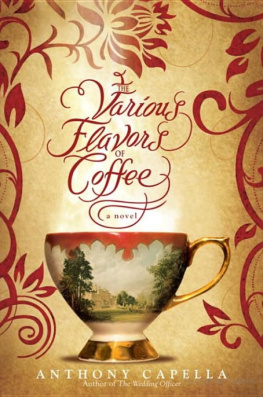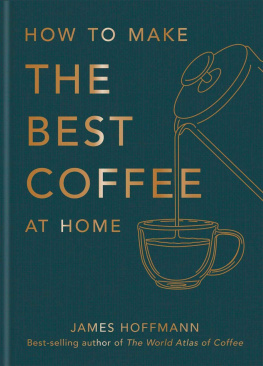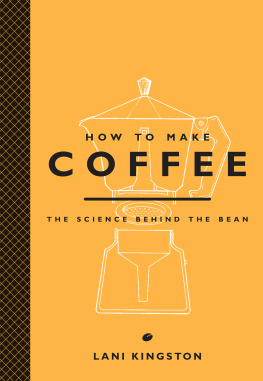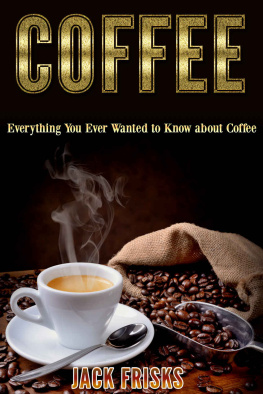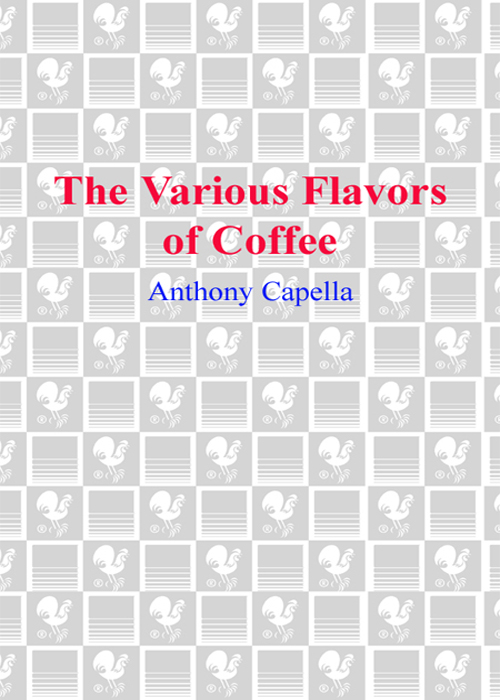
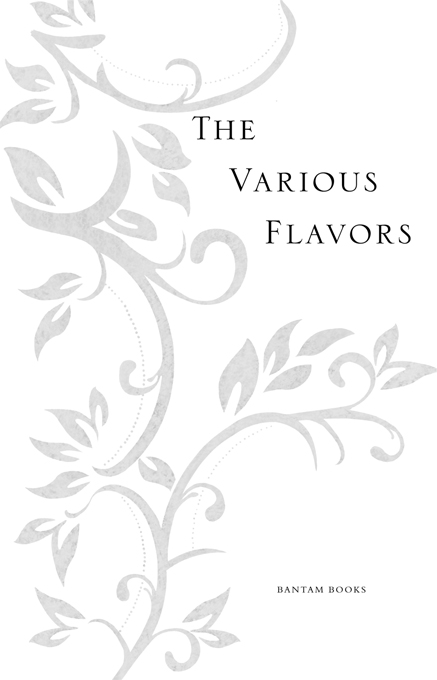
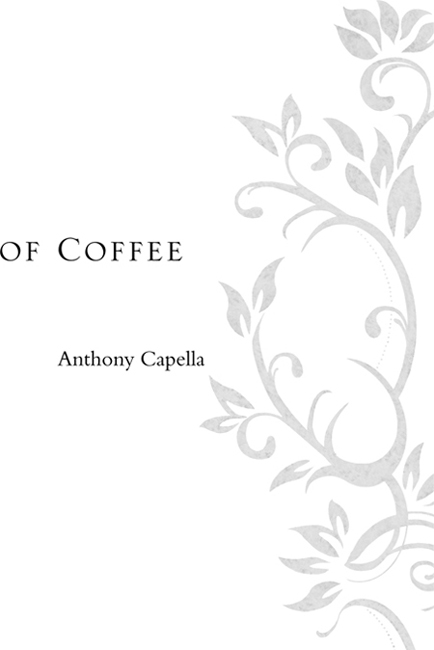
THE VARIOUS FLAVORS OF COFFEE
CONTENTS
Yesterday
a drop of semen,
tomorrow
a handful of spice
or ashes
MARCUS AURELIUS, Meditations
THE VARIOUS FLAVORS OF COFFEE
PART I

Much about coffees flavor still remains a mystery.
TED LINGLE, The Coffee Cuppers Handbook
[ONE]
W HO IS HE, THIS YOUNG MAN WHO STROLLS TOWARD US down Regent Street, a carnation in his collar and a cane in his hand? We may deduce that he is well off, since he is dressed in the most fashionable clothesbut we would be wrong; we may deduce that he likes fine things, since he stops to look in the window of Liberty, the new department store devoted to the latest stylesor is that simply his own reflection he is admiring, the curling locks that brush his shoulders, quite unlike the other passersby? We may deduce that he is hungry, since his footsteps speed up noticeably as they take him toward the Caf Royal, that labyrinth of gossip and dining rooms off Piccadilly; and that he is a regular here, from the way he greets the waiter by name, and takes a Pall Mall Gazette from the rack as he moves toward a table. Perhaps we may even conclude that he is a writer, from the way he pauses to jot something down in that calfskin-leather pocket-book he carries.
Come along; I am going to introduce you. Yes, I admit itI know this ludicrous young man, and soon you will know him, too. Perhaps after an hour or two in his company you will consider you know him a little too well. I doubt that you will like him very much: that is of no consequence, I do not like him very much myself. He iswell, you will see what he is. But perhaps you may be able to see past that, and imagine what he will become. Just as coffee does not reveal its true flavor until it has been picked, husked, roasted and brewed, so this particular specimen has one or two virtues to go along with his vices, although you may have to look a little harder to spot them.... Despite his faults, you see, I retain a sort of exasperated affection for the fellow.
The year is 1896. His name is Robert Wallis. He is twenty-two years old. He is me, my younger self, many years ago.
[TWO]
I N 1895 I HAD BEEN SENT DOWN FROM OXFORD, HAVING FAILED my Preliminary Examinations. My expulsion surprised no one but myself: I had done little work, and had chosen as my associates young men notable for their idleness and dissolution. I learned very littleor perhaps it is fairer to say that I learned too much; those were the days, you will recall, when undergraduates chanted Swinburne as they rioted down the HighCould you hurt me, sweet lips, though I hurt you? / Men touch them, and change in a trice / The lilies and languors of virtue / For the raptures and roses of viceand the college servants still talked in shocked tones of Pater and Wilde. Among the monkish cloisters a mood of languid romanticism prevailed, which prized beauty, youth and indolence above all things, and the young Robert Wallis imbibed this dangerous doctrine along with all the other heady aromas of the place. I spent my afternoons writing poetry, and my fathers allowance on silk waistcoats, fine wines, brilliant peacock feathers, slim volumes of verse bound in yellow vellum, and other objets essential to the artistic life, all of which were available on ready credit from the tradesmen of the Turl. Since my talent for poetry, like my allowance, was actually rather more meager than I cared to acknowledge, it was inevitable that this state of affairs would eventually come to a sorry end. By the time I was sent down I had exhausted both my funds and my fathers patience, and I was soon faced with the necessity of finding a source of incomea necessity which, I am ashamed to say, I intended to ignore for as long as possible.
London at that time was a great, seething cesspit of humanity; yet, even in that dung-heap, lilies grewindeed, they flourished. Out of nowhere, it seemed, there had come upon the capital a sudden outpouring of frivolity. The Queen, in mourning, had retired from public life. Released from her attention, the Prince began to enjoy himself, and where he led, the rest of us followed. Courtiers mingled with courtesans, dandies moved among the demi-monde, aristocrats dined with aesthetes, and rough trade mixed with royalty. Our house magazine was the Yellow Book; our emblem was the green carnation; our style was what came to be known as nouveau, and our mode of speech was the epigramthe more paradoxical the better, preferably tossed into the conversation with a certain practiced, weary melancholy. We celebrated the artificial above the natural, the artistic above the practical, and, Oscar Wilde notwithstanding, laid claim to extravagant vices which few of us had any intention of actually indulging. It was a glorious time to be young and in London, and I was to miss most of itcurse it!all because of a chance remark I happened to make in the hearing of a man named Pinker.
[THREE]
The primary factor affecting the taste is the selection of the beans.
LINGLE, The Coffee Cuppers Handbook

I WAS HAVING BREAKFAST IN THE CAF ROYALA PLATE OF OYSTERS and a dish of thickly sliced ham with green saucewhen the waiter brought my coffee. Without looking up from my newspaper I drank some, frowned, and said, Damn it, Marsden, this coffee tastes rusty.
Its ver same as all ver other customers is drinking, the waiter said haughtily. None of vem, as Im aware, have seen the necessity for complaint.
Are you saying Im pernickety, Marsden?
Will there be anyfink else, sir?
As a waiter, Marsden, you have mastered every skill except waiting. As a wit, you have mastered every requirement except humor.
Fank you, sir.
And yes, I am pernickety. For a well-made cup of coffee is the proper beginning to an idle day. Its aroma is beguiling, its taste is sweet; yet it leaves behind only bitterness and regret. In that it resembles, surely, the pleasures of love. Rather pleased with this aperu, I again sipped the coffee that Marsden had brought. Although in this case, I added, it seems to taste of nothing much except mud. With, perhaps, a faint aftertaste of rotten apricots.
My pleasure, sir.
I dont doubt it. I turned my attention back to the Gazette.
The waiter lingered a moment. Will ver young gentleman be paying for his breakfast this morning? he inquired, with just a trace of fashionably weary melancholy.
On my tab, please, Marsden. Theres a good fellow.
AFTER A WHILE I became aware that someone had joined me at my table. Glancing over my newspaper, I saw that my companion was a small gnome-like gentleman, whose sturdy frock coat marked him out from the usual swells and dandies who frequented that place. I was myself expecting to be joined at any moment by my friends Morgan and Hunt, but since the hour was early and the room mostly unoccupied, it would be no great inconvenience to move to another table when they arrived. I was, however, somewhat curious, since the same surfeit of tables made it all the more surprising that the stranger should sit at mine uninvited.
Next page

